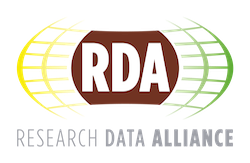UPDATE: RDA/IGAD Webinar Series: Intelligent Plant Data Linkage Webinar set for April 16
06/04/2020


UPDATE: As part of the Research Data Alliance's (RDA)/ Agricultural Data Interest Group's (IGAD) ongoing webinar series, aimed to keep up with cutting edge developments in agricultural data, and encourage the free flow of ideas, the next webinar is set to take place on Thursday, April 16.
The webinar will focus on “Intelligent Plant Data Linkage: A View from History, Philosophy and Social Studies of Science,” and will feature Sabina Leonelli, Professor of Philosophy and History of Science at the University of Exeter and Hugh Williamson, Research Fellow at the University of Exeter.
Interested participants can register here.

Background:
Making data move across sites and communities of users continues to pose enormous logistical, scientific and ethical challenges, given the variety of conceptual backgrounds, material environments and social landscapes in which data are produced, evaluated and traded. This talk builds on extensive empirical studies of data curation and re-use in various areas of plant science to consider the conditions under which data can effectively travel across settings, groups, institutions and locations - and with which implications. Understanding these conditions is particularly relevant in the context of interdisciplinary, global collaborations targeting food security, where the linking of data coming from different sources constitutes at once a tantalizing opportunity and a significant scientific, ethical, economic and political problem. By illustrating what it takes to mobilise data responsibly across settings, the session will:
-
elicit debate over the complexity of plant data governance and its various publics;
-
highlight the crucial role of data curators in ensuring modes of data re-use that are sustainable, reliable and trustworthy; and
-
reflect on the implications of this opportunity for the status and training of curators within the wider research landscape.
Speaker Bios:
Sabina Leonelli is Professor of Philosophy and History of Science at the University of Exeter, where she co-directs the Centre for the Study of the Life Sciences (Egenis) and leads the “Data Governance, Algorithms and Values” strand of the Institute for Data Science and Artificial Intelligence (www.datastudies.eu). She is a Fellow of the Alan Turing Institute in London, Editor-in-Chief of History and Philosophy of the Life Sciences, and Associate Editor of the Harvard Data Science Review. Her research concerns the methods, infrastructures and assumptions involved in the use of big data for discovery; the epistemology of data-intensive science and its social and scientific implications; the role of the open science movement within global shifts in the production and publication of knowledge; and the status and history of organisms as scientific models and data sources. Leonelli’s work has long focused on the plant sciences, starting from her PhD thesis on the history and use of the model organism Arabidopsis thaliana to her current interest in plant phenomics and the semantics of crop data linkage. She is interested in archival and classificatory practices in plant biology, and the intersection between the digital and the material in the curation of data and specimens. Her publications span the fields of philosophy, social science, biology, history, data science and science policy, and include the award-winning book Data-Centric Biology: A Philosophical Study (2016) and the forthcoming Open Access volume Data Journeys in the Sciences (Springer, 2020). She has worked with the European Commission and a number of national governments and funding bodies on the development and implementation of Open Science policies. From 2012 to 2016, she was a member of the Global Young Academy and lead of their working group on Open Science. She has just been elected member of the Académie Internationale de Philosophie de la Science.
Hugh Williamson is Research Fellow at the University of Exeter, working on the Alan Turing Institute-funded project ‘From Field Data to Global Indicators: Towards a Framework for Intelligent Plant Data Linkage’. He is based in Egenis, the Exeter Centre for the Study of the Life Sciences. Hugh holds a PhD in Social Anthropology from the University of Cambridge, where he researched agroecological conservation and rural development in Romania. Alongside anthropology, his work draws on science and technology studies (STS) and the history and philosophy of science.
